Covid: Wales' Covid laws and mass testing to be axed
- Published
- comments
Protection or an infringement of freedoms? People in Wales have been wearing masks for almost two years
Wales is to scrap its remaining Covid restrictions and end free mass testing under plans announced on Friday.
Legal rules on wearing masks and self-isolation are expected to end on 28 March.
From the same date, most people with symptoms will no longer be able to get PCR tests, and free lateral flow tests (LFTs) will end from June.
The country will be the last part of the UK to totally lift its coronavirus restrictions.
While it will no longer be law to wear masks or self-isolate if people have coronavirus when rules end, First Minister Mark Drakeford said people would be advised to do so.
Welsh Conservatives called for restrictions to be lifted now, but Mark Drakeford said he would not "throw away" an approach he said had the public's support.

What is the plan for mass testing in Wales?
Wales' testing regime had been in doubt since the UK government, which pays for much of the infrastructure, announced that free mass testing would cease in England on 1 April.
From that date free testing in England will be targeted at vulnerable people.
In Wales from 28 March:
The use of PCR tests - processed in a lab - by the general public will stop
LFTs will be available online for free - but only for testing people who have symptoms
While self-isolation will no longer be law, people will still be advised to get a test if they have symptoms and isolate if positive
Contact tracing will continue
From the end of June:
LFTs cease to be available for testing people with symptoms
Contact tracing and self-isolation support payments end
Self-isolation guidance will be changed to take additional precautions when ill, such as staying at home if possible
PCR tests will be kept for certain groups, such as health and social care staff with symptoms and care home residents, and hospital patients.
The decision means LFTs will be available for free for a few months longer than they will be in England.
Businesses have been among those calling for them to continue to be available without charge.
Covid: Wales enters 'steady state' in managing virus
Around the end of March routine asymptomatic testing in most schools, childcare and workplaces will also end.
Mr Drakeford said there would be "no cliff-edge end to testing as we've seen in England".
He said decisions made by the UK government had a "direct impact on our ability to go on providing testing at the level we would have thought was proportionate".
The first minister said he attempted "unsuccessfully" to persuade the UK government to "take a more gradual approach".
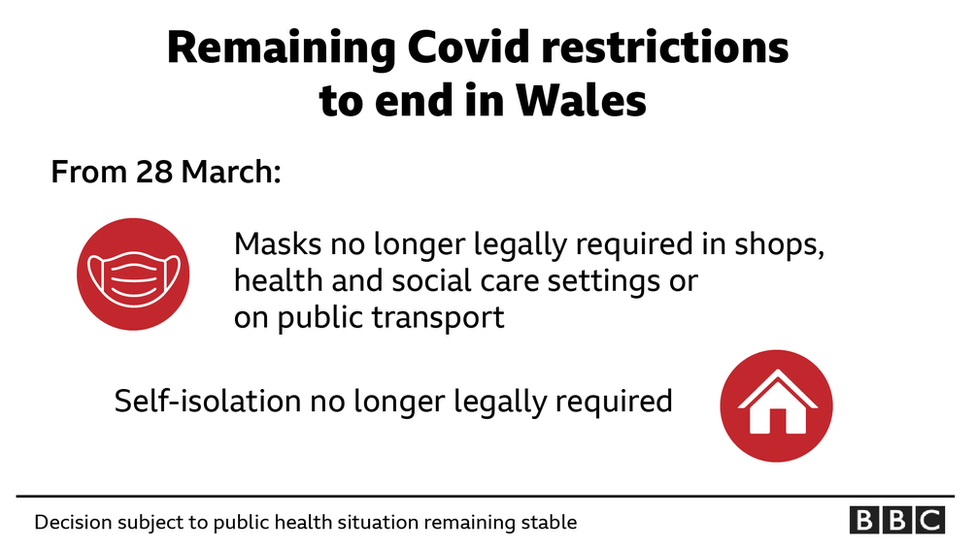
Drakeford 'will not throw away' slower approach
The Welsh government has said the date for ending its coronavirus legislation will still need to be confirmed in three weeks time, and will depend on Wales' Covid situation.
In the meantime the regulations, including the requirement for businesses to have Covid risk assessments, will stay in place.
The first minister defended not easing the restrictions sooner at a press conference, saying it followed advice from his Chief Medical Officer Dr Frank Atherton to ensure cases continue to fall.
"I think our way of doing things has succeeded, and I think it has secured the support of the bulk of the population in Wales, and I don't intend to throw all that away", he said.
Mr Drakeford warned the pandemic "isn't over" and there could be "fluctuations in global patterns of infection for several years".
He told BBC Radio Wales after legislation "lapses", it could be reintroduced "should something unexpected happen".
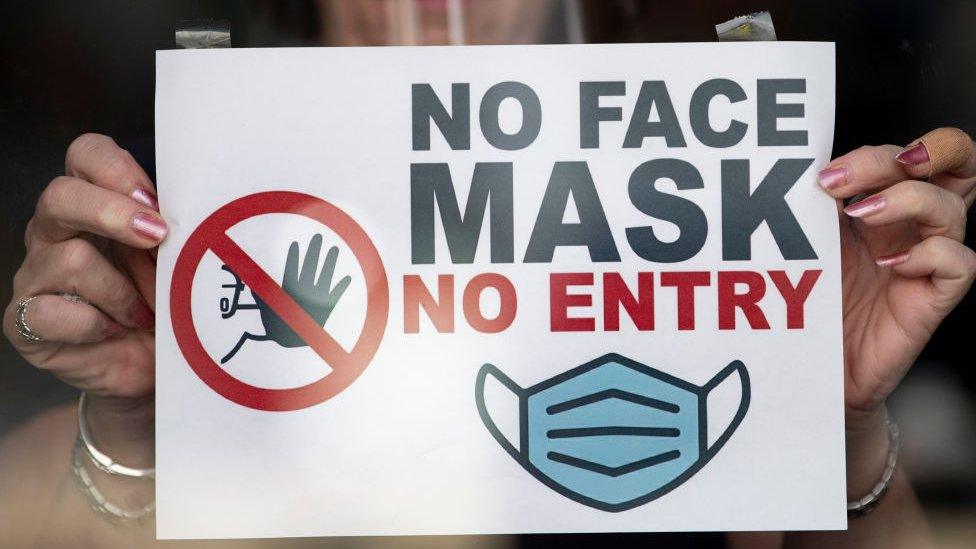
While face mask rules have been scrapped in England, they are still legally required to be worn in many places in Wales
The Welsh NHS currently has capacity to do 15,000 PCR tests a day, although during the pandemic more tests in the community have been analysed in UK government labs.
Chief medical officer Dr Sir Frank Atherton said he advised the Welsh NHS keeps testing capacity in part so it can respond to new variants.
He said UK government scientific advice says that future variants "are highly likely to appear" and may lead to more "harm" than seen with Omicron.
However, Welsh officials also believe further waves of infection can be managed by the NHS because of vaccines and drug treatments.
The Welsh government has promised vaccination boosters in the spring for the elderly and most vulnerable adults, and a regular Covid vaccination programme from the autumn.
The Senedd leader of the Welsh Conservatives, Andrew RT Davies, said the legal restrictions should be lifted now rather than wait until the end of the month.
Mr Davies added: "The First Minister couldn't really offer a scientific argument to sustain these restrictions here in Wales".
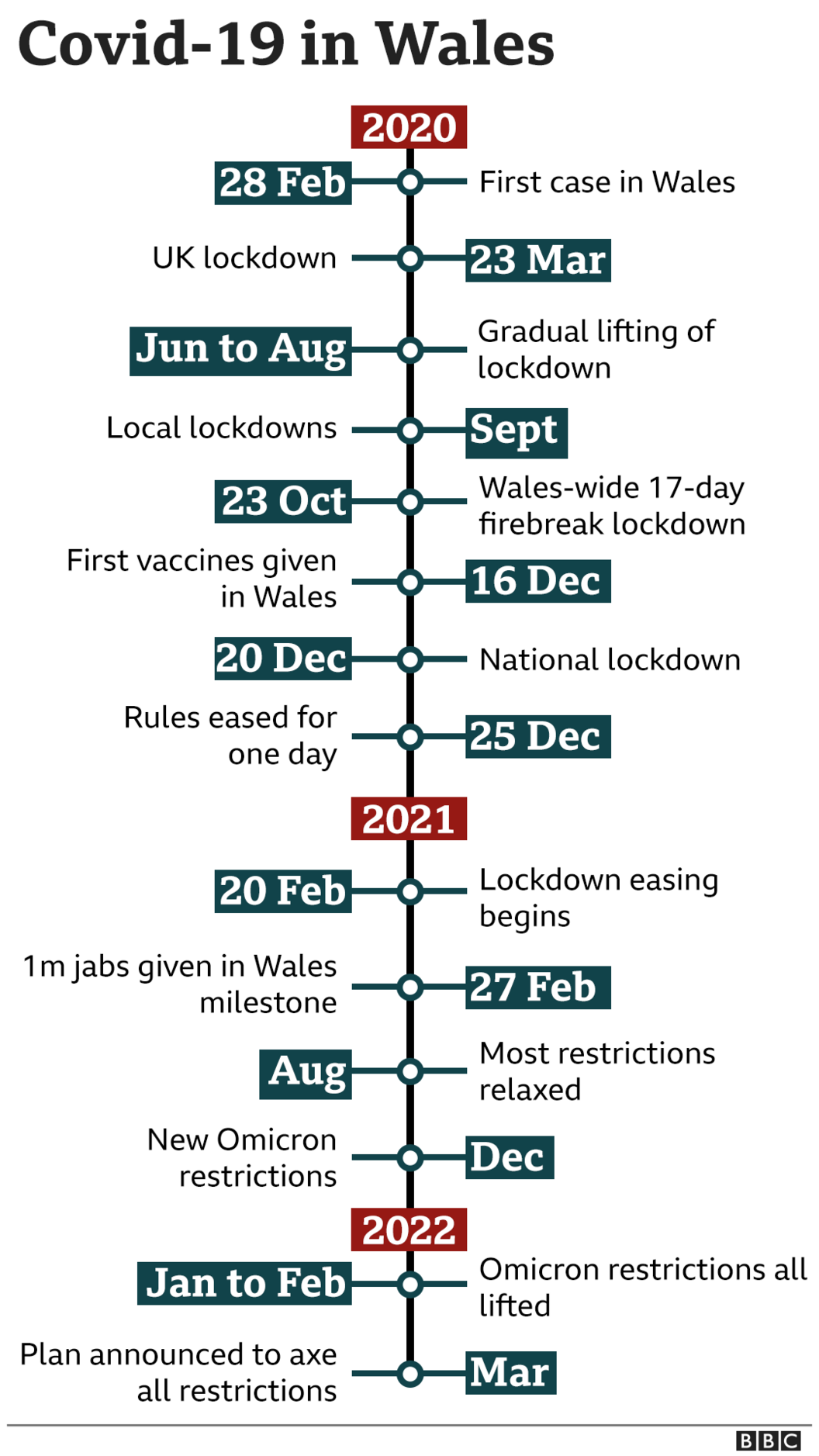

Plaid Cymru's health spokesman said it was important to know how the Welsh government would respond if "things take a turn for the worst, which of course we hope they won't".
"How prepared is government to act quickly, and what would acting quickly look like," said Rhun ap Iorwerth.
Coronavirus regulations of one form or another have been in place since the first 2020 lockdown two years ago, although the measures that are still in force came into being at a later date.
Mask wearing laws to end
Wales was the last country in the UK to make masks mandatory in shops - in September 2020. The legal requirement to self-isolate became law two months later.
In recent weeks, mask wearing rules have eased but people must continue to wear them by law in shops, salons and hairdressers, on public transport and in health and social care settings.
That legal requirement is set to end by the end of March, bringing the country in line with the other three nations.
Mr Drakeford said he did not expect to see "a sudden cliff edge" in people not wearing masks.
"I think that while the legal requirement we hope will be lifted on the 28 March, the need to go on doing the right thing, particularly in vulnerable places likes care homes and hospitals, will not have any date", he added.
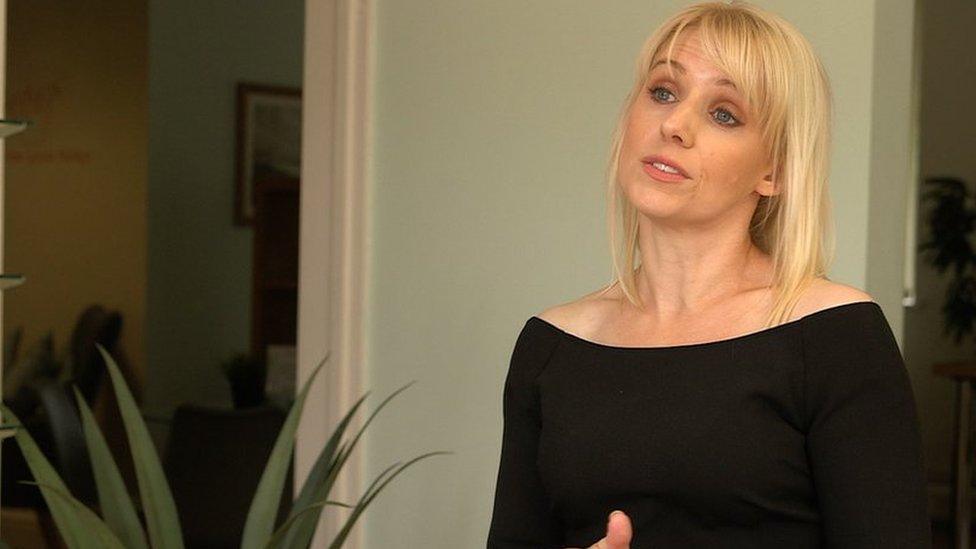
Salon owner Sarah Bruton says ending the mask wearing law will only better communication between staff and customers
Sarah Bruton, who owns Captiva Spa and Lounge in Caerphilly, said she was "delighted" rules were coming to an end.
While she will not be rushing to drop all restrictions at once, "at least we get to make personal choices now rather than have it mandated", she said.
Ms Bruton told BBC Radio Wales it would be "very difficult" to make customers take a lateral flow test before arriving at the spa, but it would be encouraging them and staff to stay at home if they feel unwell.
It is about "making sensible decisions", she added.
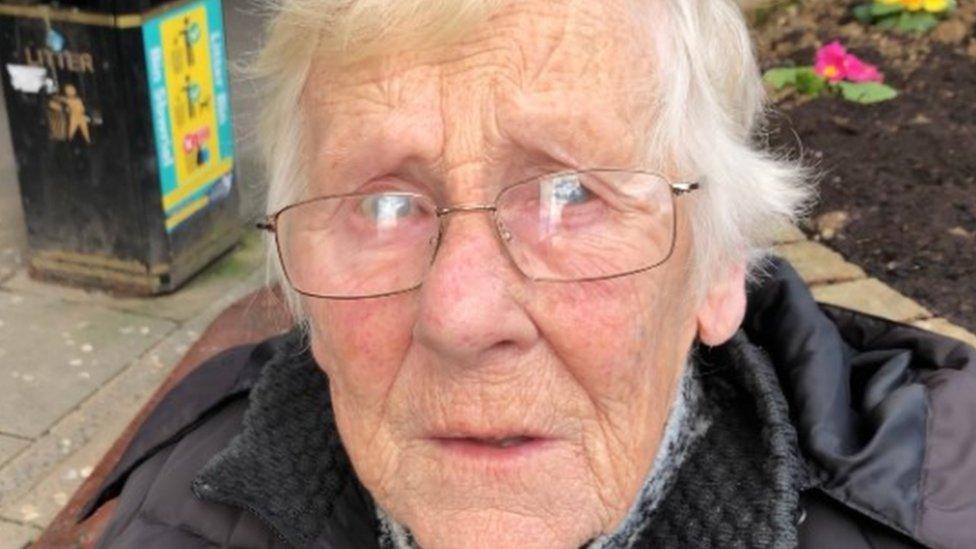
Anne Evans will continue to wear a mask
In Carmarthenshire, some shoppers said they would be cautious despite the end of rules.
"I will continue to wear the mask, I think it is safer," said Anne Evans, 84.
David Williams agreed and will continue wearing one in "crowded areas", adding: "With these new variants, you don't know what is around the corner."
His wife Doris added: "Although, we do feel safer because we have been vaccinated."
Care worker Paul Voag said he would still have to wear a mask when he is with clients.
"We will have to move forward at some point I don't think it will ever go away," he said.
"It is going to be like the flu and we take precautions accordingly."


This is a significant milestone in the story of the pandemic.
Laws on wearing masks in shops and self-isolating weren't introduced until autumn 2020, months after the first deadly wave of infections.
Wales will cling on to those rules longer than any other part of the UK.
Scrapping them will mark the beginning of a new phase when we are expected to live with Covid as we do with other infectious disease.
For many, it will be a difficult adjustment. Getting to this point has involved huge upheaval and trauma.
Covid has upended our lives and appeared on 9,696 death certificates in Wales.

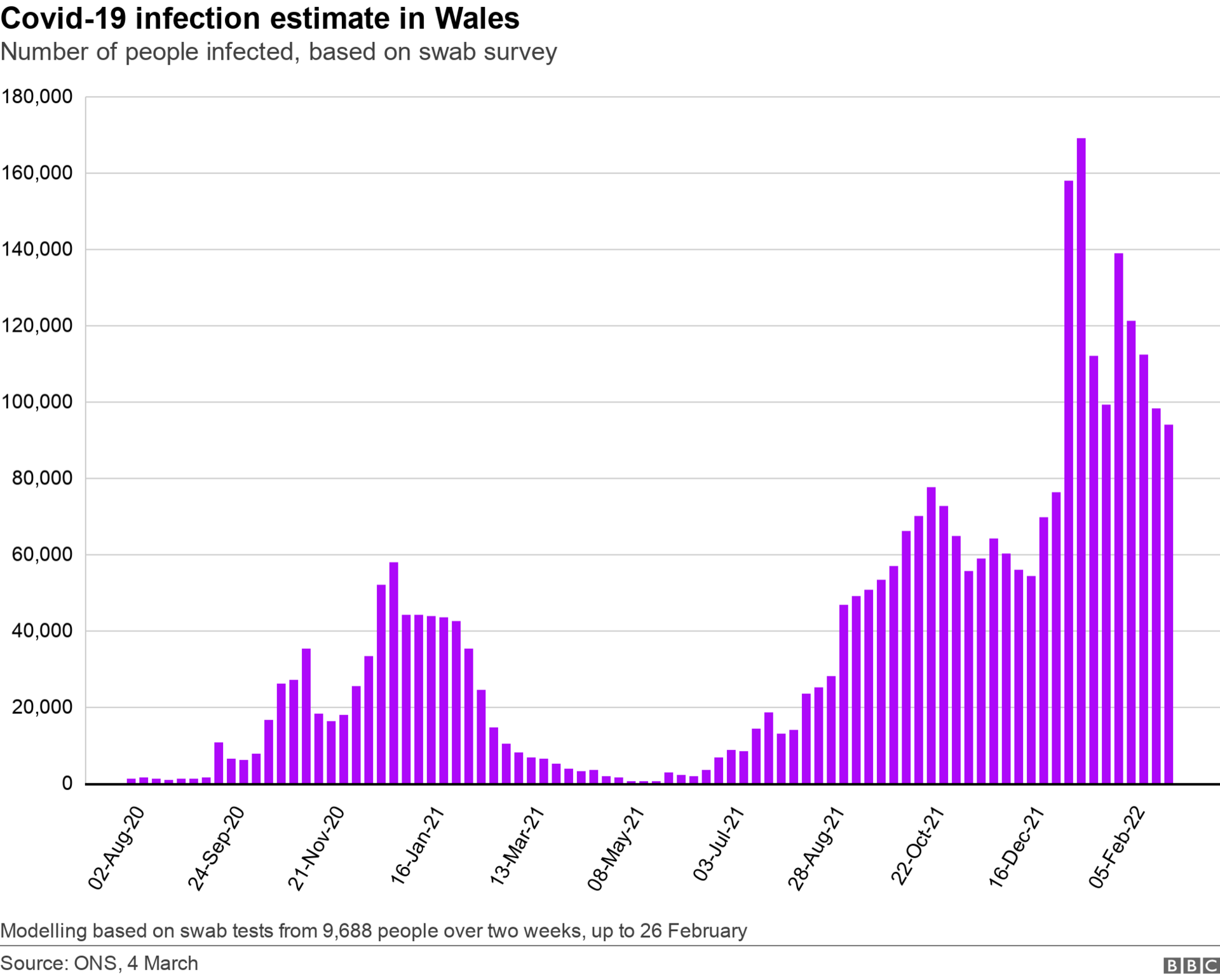

Latest figures from the Office of National Statistics suggest that infections have continued to fall, although experts say their latest estimate is uncertain.
Figures from the swab survey of more than 9,600 people estimates one in 30 people in Wales had Covid in the week ending 26 February.
That is 94,200, down on last week's 98,200.
- Published4 March 2022
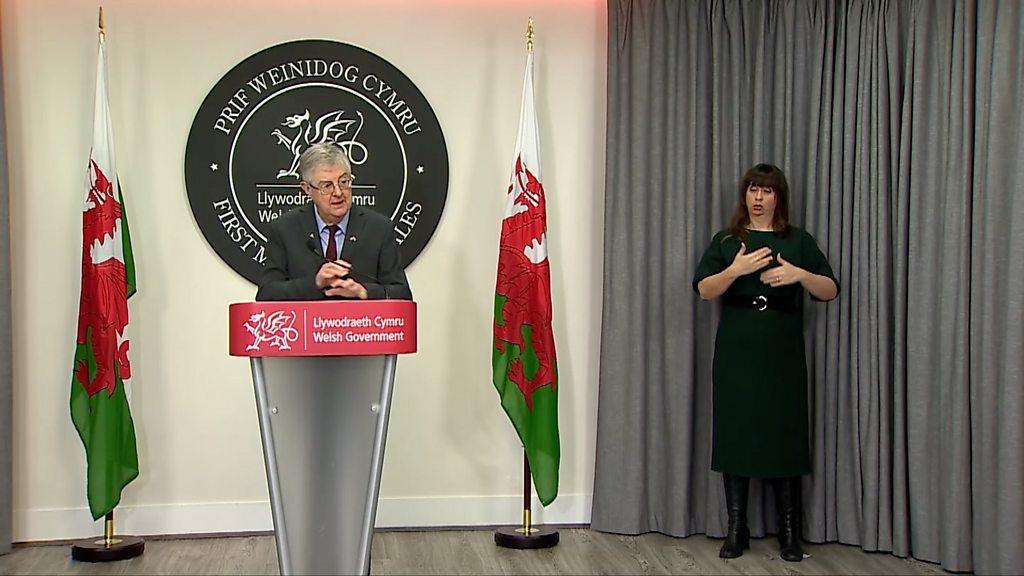
- Published27 May 2022

- Published1 July 2022

- Published28 May 2024
